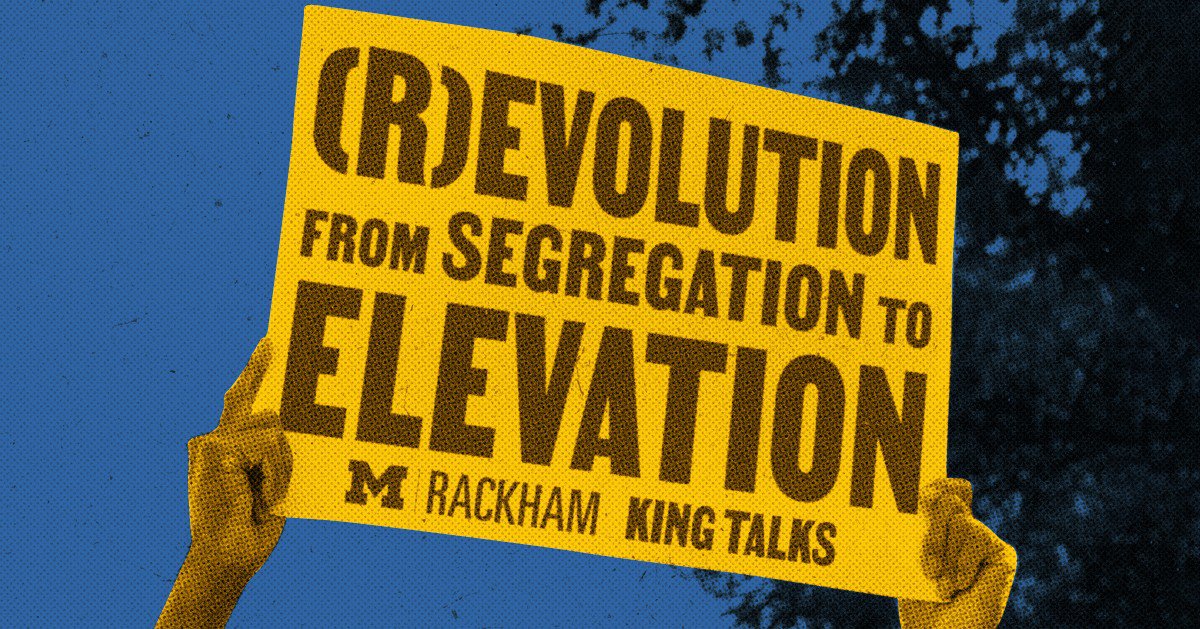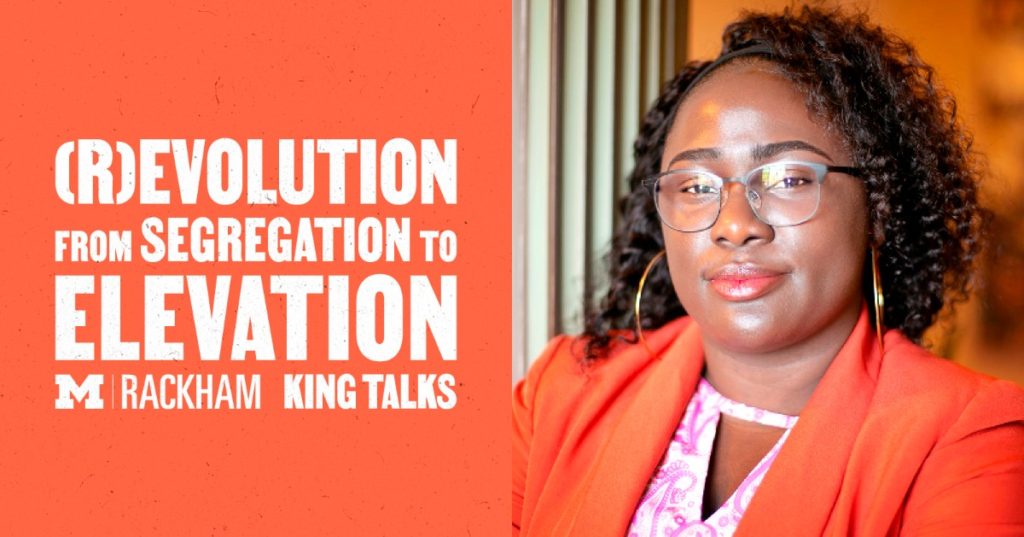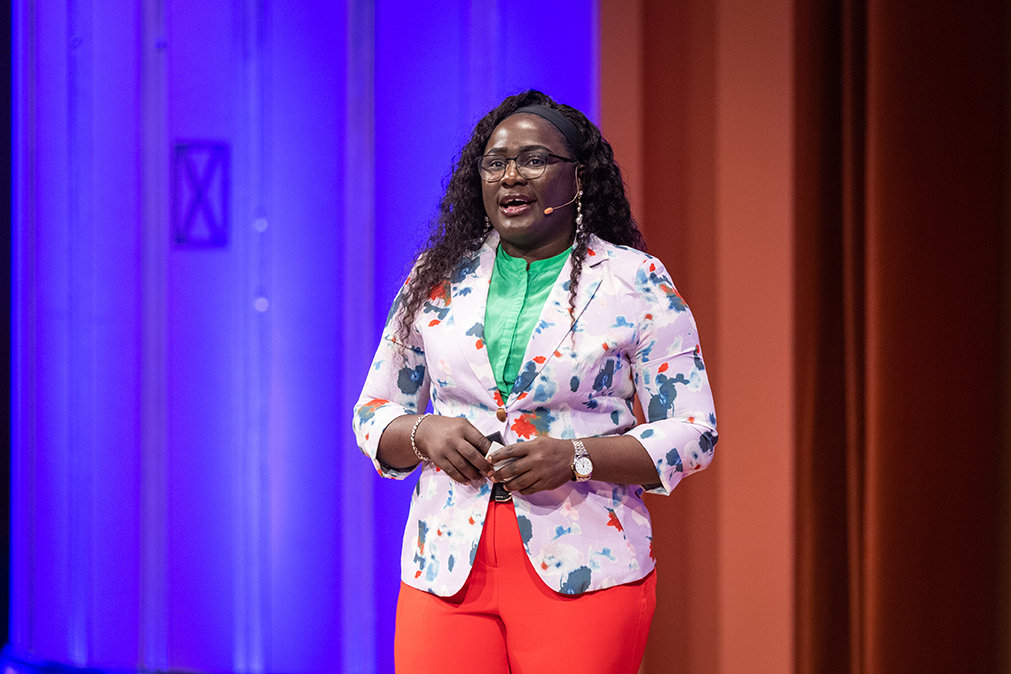
Rackham King Talks: Nwankwo Discusses Importance of Breaking Barriers in Space Sciences
Onyinye Nwankwo, a Ph.D. student, spoke about the space sciences in the Rackham King Talks honoring the life and work of Dr. Martin Luther King, Jr.

Onyinye Nwankwo, a Ph.D. student, spoke about the space sciences in the Rackham King Talks honoring the life and work of Dr. Martin Luther King, Jr.
Honoring the life and work of Dr. Martin Luther King, Jr., students in Rackham Graduate School shared the relevance of their studies to his legacy during the King Talks. Onyinye Nwankwo, a Ph.D. student at U-M Climate and Space, was among the students featured in this year’s King Talks.
The TED-style talks, given on January 26, followed the theme of the annual Martin Luther King, Jr., Symposium at the University of Michigan. This year’s theme was “The (R)evolution of MLK: From Segregation to Elevation.”
“The King Talks were created in 2017 with two specific objectives in mind,” said Paul Artale, of Rackham Graduate School. “First, we wanted Rackham’s contribution to the MLK Symposium to be notable and memorable, as an annual tradition that grew and evolved. Second, we wanted it to exclusively feature Rackham graduate students sharing their expertise.”
Nwankwo presented a talk on “Breaking Barriers: Evolution in Thoughts about Space Sciences.” In her speech, she examined how the field of space sciences has evolved over time, explored the impacts of space weather on communication technological infrastructure, and discussed how the field can become more inclusive.

“Today’s constant usage of communication satellites in relaying radio wave signals around geographical points of the globe makes it impossible not to emphasize and elaborate on the impact of space weather as a subfield in space sciences. Interestingly, many people have no idea of the stronger possibilities that this subfield holds,” said Nwankwo. “Hence, there is an urgency to create awareness.”
During her talk, Nwankwo called to mind visions of Earth’s night skies, outer space and the Milky Way.
“Most people when they hear anything about space science, what comes to mind is space exploration. It seems, historically speaking, space exploration has captured the imagination of people for centuries, and it continues to be a source of fascination even to this day,” she said. “Space science actually encompasses much more than space exploration. In fact, space science also includes the study of the atmosphere and climate of our home planet.”
Speaking to an interdisciplinary group of students, faculty, and guests, Nwankwo asked the audience how many people understood the concept of space weather. Not many in the audience raised their hands.
“You’re not alone.” Nwankwo explained that she didn’t learn about space weather until 2016, when she attended a space weather conference in Abuja, Nigeria. “At first, I felt intimidated by the technical and scientific aspects of the field of space weather. At the same time, I became excited. I was excited to feel what this space weather is and to learn my place in it.”

After earning a bachelor of science at Nnamdi Azikiwe University, Nwankwo went on to study at the National Mathematical Centre in Nigeria, the National Institute for Space Research in Brazil, and the Institute for Space-Earth Environmental Research at Nagoya University in Japan. Now, she is working toward her Ph.D. in atmospheric and space sciences at the University of Michigan.
“Despite all the achievements in understanding space weather and space weather events, there is [a] lack of diversity. There is [a] lack of diversity of certain groups, like women and people of color,” she said. “It is important for stakeholders to support efforts in breaking funding challenges in the field of space weather and making it more welcoming for more people to consider careers in the field.”
She pointed to 2018 data from the National Science Foundation that shows faculty in the space sciences at U.S. colleges and universities consist of 10 percent women, and only 3 percent African Americans and 4 percent Hispanic populations.
“Overcoming these barriers and increasing diversity in the fields of space weather can bring new perspectives and ideas to the table and make the field more welcoming to all,” she said. “We can do that by promoting diversity in hiring and encouraging diversity in leadership, which are key steps.”
Nwankwo said space weather has been a source of hope and inspiration for many people across the world, and it is the basis for ‘very powerful and exciting ideas.’
“When we support inclusiveness in the space science, we can make the field more welcoming,” said Nwankwo.